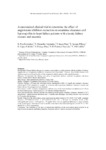Mostrar o rexistro simple do ítem
A randomized clinical trial to determine the effect of angiotensin inhibitors reduction on creatinine clearance and haemoglobin in heart failure patients with chronic kidney disease and anaemia
| dc.contributor.author | Pita-Fernández, Salvador | |
| dc.contributor.author | Chouciño Fernández, Teresa | |
| dc.contributor.author | Juega-Puig, J. | |
| dc.contributor.author | Seoane-Pillado, Teresa | |
| dc.contributor.author | López-Calviño, Beatriz | |
| dc.contributor.author | Pértega-Díaz, Sonia | |
| dc.contributor.author | Pedreira, José D. | |
| dc.contributor.author | Gil-Guillén, V. | |
| dc.date.accessioned | 2018-01-10T10:06:19Z | |
| dc.date.available | 2018-01-10T10:06:19Z | |
| dc.date.issued | 2014-07-16 | |
| dc.identifier.citation | Pita-Fernández S, Chouciño-Fernández T, Juega-Puig J, et al. A randomized clinical trial to determine the effect of angiotensin inhibitors reduction on creatinine clearance and haemoglobin in heart failure patients with chronic kidney disease and anaemia. Int J Clin Pract. 2014;68(10):1231-1238 | es_ES |
| dc.identifier.issn | 1368-5031 | |
| dc.identifier.issn | 1742-1241 | |
| dc.identifier.uri | http://hdl.handle.net/2183/19979 | |
| dc.description | Trial registration: EudraCT: 2008-008480-10 | es_ES |
| dc.description.abstract | [Abstract] Background. Chronic kidney disease is a common comorbidity in elderly patients with heart failure. Evidence supports the use of angiotensin inhibitors for patients with heart failure. However, there is little evidence with which to assess the risk and benefits of this treatment in elderly patients with renal dysfunction. Objective. To determine the efficacy and safety of angiotensin inhibitor reduction in patients with heart failure, chronic kidney disease and anaemia. Study design. Open randomized controlled clinical trial. Setting. Complexo Hospitalario Universitario A Coruña (Spain). Patients. Patients ≥ 50 years old, with heart failure, haemoglobin (Hb) < 12 mg/dl and creatinine clearance <60 ml/min/1.73 m2 admitted to hospital, in treatment with angiotensin inhibitors. Informed consent and Ethical Review Board approval were obtained. Intervention. A 50% reduction of angiotensin inhibitor dose of the basal treatment on admission (n = 30) in the intervention group. Control group (n = 16) with the standard basal dose. Main outcome measure. Primary outcome was difference in Hb (gr/dl), creatinine clearance (ml/min/1.73 m2) and protein C (mg/dl) between admission and 1–3 months after discharge. Secondary outcome was survival at 6–12 months after discharge. Results. Patients in the intervention group experienced an improvement in Hb (10.62–11.47 g/dl), creatinine clearance (32.5 ml/min/1.73 m2 to 42.9 ml/min/1.73 m2), and a decrease in creatinine levels (1.98–1.68 mg/dl) and protein C (3.23 mg/dl to 1.37 mg/dl). There were no significant differences in these variables in the control group. Survival at 6 and 12 months in the intervention and control group was 86.7% vs. 75% and 69.3% vs. 50%, respectively. Conclusion. The reduction of the dose of angiotensin inhibitors in the intervention group resulted in an improvement in anaemia and kidney function, decreased protein C and an increased survival rate. | es_ES |
| dc.language.iso | eng | es_ES |
| dc.publisher | Wiley | es_ES |
| dc.relation.uri | http://dx.doi.org/10.1111/ijcp.12475 | es_ES |
| dc.rights | This is the peer reviewed version of the article which has been published in final form at Wiley Online Library. This article may be used for non-commercial purposes in accordance with Wiley Terms and Conditions for self-archiving. | es_ES |
| dc.subject | Anemia | es_ES |
| dc.subject | Angiotensin receptor antagonists | es_ES |
| dc.subject | Creatinine | es_ES |
| dc.subject | Heart failure | es_ES |
| dc.subject | Hemoglobin | es_ES |
| dc.subject | Renal insufficiency chronic | es_ES |
| dc.title | A randomized clinical trial to determine the effect of angiotensin inhibitors reduction on creatinine clearance and haemoglobin in heart failure patients with chronic kidney disease and anaemia | es_ES |
| dc.type | info:eu-repo/semantics/article | es_ES |
| dc.rights.access | info:eu-repo/semantics/openAccess | es_ES |
| UDC.journalTitle | The International Journal of Clinical Practice | es_ES |
| UDC.volume | 68 | es_ES |
| UDC.issue | 10 | es_ES |
| UDC.startPage | 1231 | es_ES |
| UDC.endPage | 1238 | es_ES |
Ficheiros no ítem
Este ítem aparece na(s) seguinte(s) colección(s)
-
GI-EIHS - Artigos [13]






